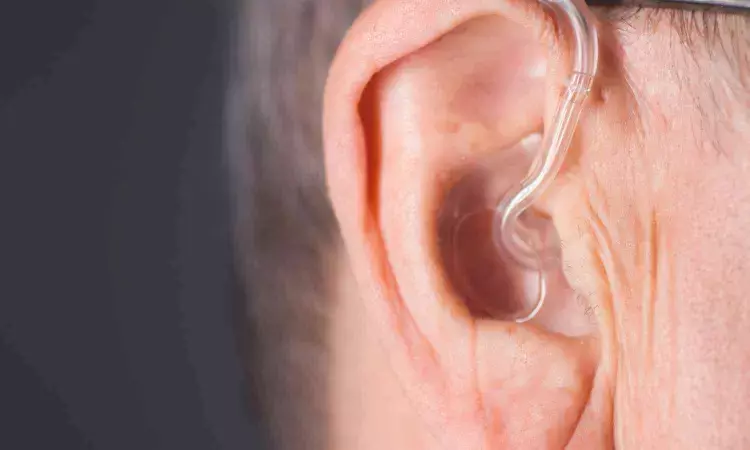- Home
- Medical news & Guidelines
- Anesthesiology
- Cardiology and CTVS
- Critical Care
- Dentistry
- Dermatology
- Diabetes and Endocrinology
- ENT
- Gastroenterology
- Medicine
- Nephrology
- Neurology
- Obstretics-Gynaecology
- Oncology
- Ophthalmology
- Orthopaedics
- Pediatrics-Neonatology
- Psychiatry
- Pulmonology
- Radiology
- Surgery
- Urology
- Laboratory Medicine
- Diet
- Nursing
- Paramedical
- Physiotherapy
- Health news
- Fact Check
- Bone Health Fact Check
- Brain Health Fact Check
- Cancer Related Fact Check
- Child Care Fact Check
- Dental and oral health fact check
- Diabetes and metabolic health fact check
- Diet and Nutrition Fact Check
- Eye and ENT Care Fact Check
- Fitness fact check
- Gut health fact check
- Heart health fact check
- Kidney health fact check
- Medical education fact check
- Men's health fact check
- Respiratory fact check
- Skin and hair care fact check
- Vaccine and Immunization fact check
- Women's health fact check
- AYUSH
- State News
- Andaman and Nicobar Islands
- Andhra Pradesh
- Arunachal Pradesh
- Assam
- Bihar
- Chandigarh
- Chattisgarh
- Dadra and Nagar Haveli
- Daman and Diu
- Delhi
- Goa
- Gujarat
- Haryana
- Himachal Pradesh
- Jammu & Kashmir
- Jharkhand
- Karnataka
- Kerala
- Ladakh
- Lakshadweep
- Madhya Pradesh
- Maharashtra
- Manipur
- Meghalaya
- Mizoram
- Nagaland
- Odisha
- Puducherry
- Punjab
- Rajasthan
- Sikkim
- Tamil Nadu
- Telangana
- Tripura
- Uttar Pradesh
- Uttrakhand
- West Bengal
- Medical Education
- Industry
Hearing Loss may be Independent risk factor for Parkinson's Disease - JAMA study

Recent research published in JAMA Neurology has unveiled a compelling link between hearing loss and Parkinson's disease, marking a significant advance in our understanding of preventable risk factors for this debilitating neurological condition. The study, analyzing data from over 3.5 million U.S. veterans through their electronic health records, provides significant evidence that hearing impairment may precede Parkinson's disease development.
The findings revealed a 26% increased risk of developing Parkinson's disease in individuals with hearing loss compared to those with normal hearing. More significantly, the research demonstrated a dose-dependent relationship - the more severe the hearing loss, the higher the risk of developing Parkinson's disease.
Using objective audiometric data rather than relying on subjective reports or clinical judgments, the study followed patients for an average of 7.6 years, with some followed up to 20 years. The study found that patients who received hearing aids within two years of their hearing loss diagnosis showed a significantly reduced risk of developing Parkinson's disease. Statistical analysis revealed that providing hearing aids to 462 people could prevent one case of Parkinson's disease over a ten-year period.
The research team also discovered that hearing loss interacts synergistically with known prodromal symptoms of Parkinson's disease, such as constipation, depression, anxiety, sleep disorders, and loss of smell. When hearing loss occurred alongside these symptoms, the risk of developing Parkinson's was higher than would be expected from either condition alone.
While the exact mechanism linking hearing loss to Parkinson's disease remains unclear, several possibilities exist. Hearing loss might directly contribute to neurodegeneration, as evidenced by studies showing elevated tau levels and accelerated brain volume atrophy in individuals with hearing impairment. Alternatively, hearing loss might work indirectly by limiting social engagement or increasing cognitive load, both known risk factors for neurological disorders.
The study's findings have significant implications for clinical practice. They suggest that hearing screening should be implemented at the primary care level, even when patients haven't expressed hearing concerns. These results are particularly relevant as we face an aging global population and an expected increase in Parkinson's disease cases. The World Health Organization projects that neurological disorders, including Parkinson's, will become leading causes of disability worldwide in coming decades.
The study's implications are clear: hearing loss should not be dismissed as an inevitable part of aging. Regular hearing screening should be incorporated into routine healthcare, especially for individuals over 40 or those with other risk factors for Parkinson's disease. Early intervention with hearing aids might serve as a practical, non-invasive strategy to potentially reduce the risk of this serious neurological condition.
This research opens new avenues for prevention and highlights the importance of considering sensory health in the context of neurodegenerative disease risk.
Reference
Neilson LE, Reavis KM, Wiedrick J, Scott GD. Hearing Loss, Incident Parkinson Disease, and Treatment With Hearing Aids. JAMA Neurol. Published online October 21, 2024. doi:10.1001/jamaneurol.2024.3568
MBBS, DrNB Neurosurgery
Krishna Shah, MBBS, DrNB Neurosurgery. She did her MBBS from GMC, Jamnagar, and there after did direct 6 Year DrNB Neurosurgery from Sir Ganga Ram Hospital, Delhi. Her interests lie in Brain and Spine surgery, Neurological disorders, minimally invasive surgeries, Endoscopic brain and spine procedures, as well as research.
Dr Kamal Kant Kohli-MBBS, DTCD- a chest specialist with more than 30 years of practice and a flair for writing clinical articles, Dr Kamal Kant Kohli joined Medical Dialogues as a Chief Editor of Medical News. Besides writing articles, as an editor, he proofreads and verifies all the medical content published on Medical Dialogues including those coming from journals, studies,medical conferences,guidelines etc. Email: drkohli@medicaldialogues.in. Contact no. 011-43720751


